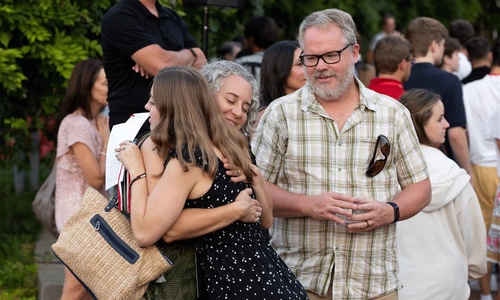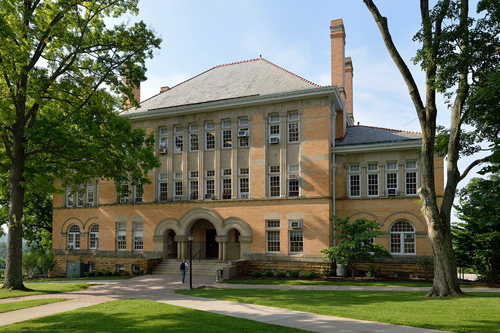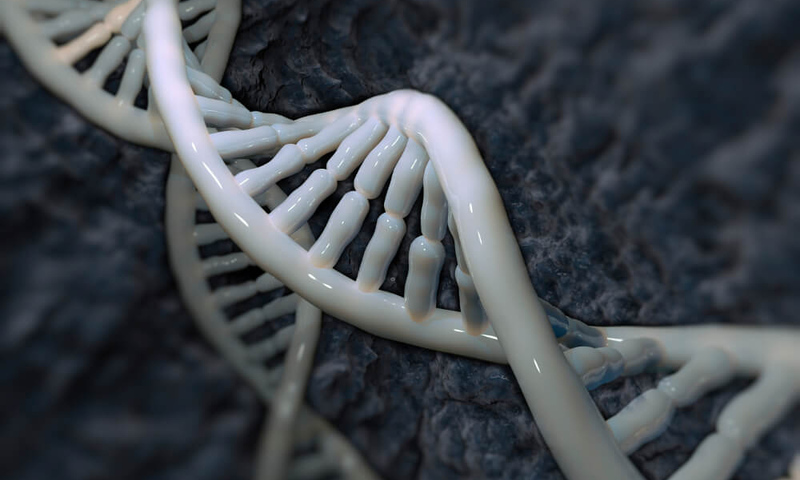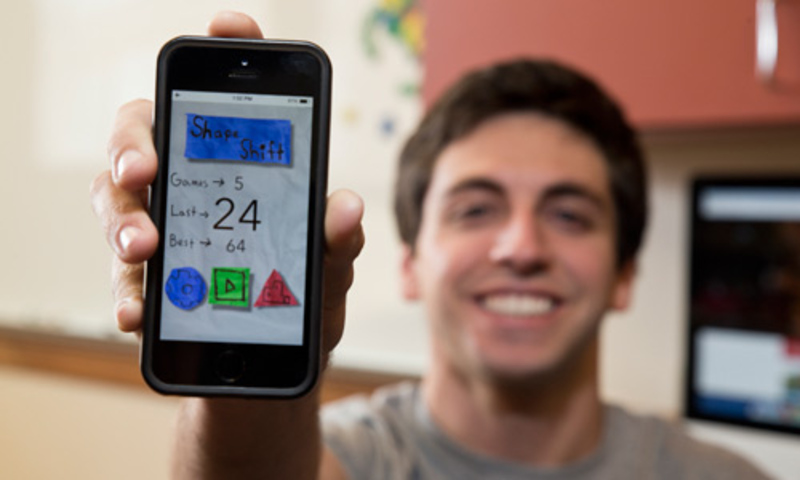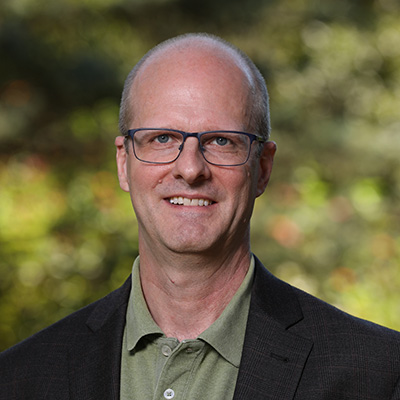
Jeff Thompson
Learning & Teaching
- Interim Dean of the Faculty, 2022-present
- Professor, Department of Biology at Denison University, 2020-present
- Associate Professor, Department of Biology at Denison University, 2009-2020
- Assistant Professor, Department of Biology at Denison University, 2003-2009
- Assistant Professor, Department of Biology at Georgian Court College, Lakewood, NJ, 1998-2003
- Adjunct Instructor, Science Division at Anne Arundel Community College, Arnold, MD, 1997-1998
- Postdoctoral Research Fellow, Department of Medicine at The Johns Hopkins University School of Medicine, Baltimore, MD, 1994-1998
Research
My research interests revolve around a branch of genetics called epigenetics. In short, epigenetics refers to non-DNA- based inheritable information that operates above-and- beyond the genetic instructions contained in cells. While genes serve as “recipes” to execute all cellular functions, epigenetic instructions can be thought of as “party planning guides”, directing cells to effectively utilize specific genes based on environmental conditions. Since epigenetic instructions are inheritable, it means that offspring cells have the potential to “learn” how to best use their genes based on the environmental experiences of their “mother” cells. My lab is specifically interested in how epigenetic phenomena influence the response to DNA damage. We have found that yeast cells which survive a DNA damaging event give rise to offspring cells that are hyper-resistant to subsequent DNA damage. This suggests that epigenetic instructions are passed from “mother” to “daughter” cells to enable them to better cope with damage. We make use of various genetic and molecular techniques to identify and characterize the nature of these epigenetic instructions, and to understand the manner by which they influence DNA damage response processes.
Undergraduate research students play an integral role in my laboratory. Ranging from single summer experiences to multi-year efforts culminating in senior research projects, student researchers are active participants in pursuing the questions that my lab is investigating. Students who make substantial contributions to our research have the opportunity to present their work at professional conferences and to be co-authors on published papers. Anyone interested in pursuing research in my lab should contact me early in the fall semester prior to the year in which they are interested in doing research to discuss potential opportunities.
Past Lab Members:
- Bhavana Huliyar (2022)
- Lillian Morrow (2021-2022)
- Claire Larsen (2018-2021)
- Isabel Wellik (2020-2021)
- Rachel Reardon (2016-2019)
- Amanda Walsh (2016-2019)
- LauraAnn Schmidberger (2016-2018)
- Sarah Higdon (2015-2016)
- Rachel Hoffman (2015-2016)
- Elizabeth Bailey (2014-2015)
- Sara Wilkes (2014-2015)
- Andrea Karl (2013-2014)
- Liesje Steenkiste (2013-2014)
- Marguerite Strong (2013)
- Arron Cole (2010-2013)
- Jono Turchetta (2012-2013)
- Dora Vines (2012-2013)
- Tom Snee (2012)
- Anna Boudoures (2010-2012)
- Jacob Pfeil (2010-2012)
- John Snee (2010)
- Alyssa Rossodivita (2008-2010)
- Megan Ansbro (2008-2009)
- Jon Mecoli (2007-2009)
- Ariel Lee (2007-2008)
- Tasha Strande (2007-2008)
- Ashley Albrecht (2006-2007)
- Maggie Evans (2006-2007)
- Andrew Keller (2005-2006)
- Arzu Arat (2005)
- Lindsey Bostelman (2004-2005)
- Katie McHugh (2004-2005)
- Leigh Stone (2004-2005)
Works
(principal investigator in regard to publications below; see resume for complete publication list)
* indicates undergraduate student co-author
- Reardon RM, Walsh AK, Larsen CI, Schmidberger LH, Morrow LA, Thompson AE, Wellik IM*, and JS Thompson. 2022. An epigenetically inherited UV hyper-resistance phenotype in Saccharomyces cerevisiae. Epigenetics & Chromatin 15:31. View online
- Boudoures AL*, Pfeil JJ*, Steenkiste EM*, Hoffman RA*, Bailey EA*, Wilkes SE*, Higdon SK*, and JS Thompson. 2017. A novel histone crosstalk pathway important for regulation of UV-induced DNA damage repair in Saccharomyces cerevisiae. Genetics 206:1389-1402 View online.
- Rossodivita AA*, Boudoures AL*, Mecoli JP*, Steenkiste EM*, Karl AL*, Vines EM*, Cole AM*, Ansbro MR*, and JS Thompson. 2014. Histone H3 K79 Methylation States Play Distinct Roles in UV-Induced Sister Chromatid Exchange and Cell Cycle Checkpoint Arrest in Saccharomyces cerevisiae. Nucleic Acids Research 42:6286-6299 View online.
- Evans ME*, Bostelman LJ*, Albrecht AM*, Keller AM*, Strande NT*, and JS Thompson. 2008. UV sensitive mutations in histone H3 in Saccharomyces cerevisiae that alter specific K79 methylation states genetically act through distinct DNA repair pathways. Current Genetics. no. 53 p. 259-274 View online.
- Bostelman LJ*, Keller AM*, Albrecht AM*, Arat A*, and JS Thompson. 2007. Methylation of histone H3 lysine-79 by Dot1p plays multiple roles in the response to UV damage in Saccharomyces cerevisiae. DNA Repair. v. 6 no. p. 383-395 View online.
- Smith PH and JS Thompson. 2003. Has polyploidy shaped the evolution of the eukaryotic genome? A re-examination of Ohno’s genome duplication hypothesis . Bios. v. 74 no. p. 110-117 View online.
- Thompson JS, Snow ML, Giles S*, McPherson LE*, and M Grunstein. 2003. Identification of a functional domain within the essential core of histone H3 that is required for telomeric and HM silencing in Saccharomyces cerevisiae. Genetics. v. 163 no. p. 447-452 View online.
Service
- American Association for the Advancement of Science (since 2017)
- Genomics Education Partnership (since 2007)
- Sigma Xi Scientific Research Society (since 2007)
- Genetics Society of America (since 2000)
- Beta Beta Beta Biology Honor Society (since 1998)
- Phi Beta Kappa (since 1988)
- Faculty Leadership Group (2020-present)
- Chair of the Faculty (2021-2022)
- President’s Medalist Selection Committee (2020-2022)
- Vice-Chair of the Faculty (2020-2021)
- Senior Administrative Review Committee, chair, (2020-2021)
- COVID-19 Response Team (2020)
- Denison University Biological Society faculty coordinator, (2019-2022)
- General Education Competency Committee (2017-2020)
- Biology Department Chair (2013-2016)
- Finance Committee (2012-2014, vice-chair 2012-2013, chair 2013-2014)
- Phi Beta Kappa, President of Theta of Ohio Chapter (2007-2013)
- Sigma Xi Chapter member (since 2007, Vice President 2013-2016, President 2019-present)
- Faculty Development Committee (2010-2013, chair 2012-2013)
- Anderson Scholarship Selection Committee (2007-2008, 2010, 2019)
- Board of Trustees Student Affairs Committee (2008-2009)
- Denison Scientific Association co-organizer (2008-2009)
- Board of Academic Integrity (2007-2009)
- Campus Affairs Council (2007-2009)
- Board of Trustees Enrollment Committee (2005-2007)
Other
- Denison University Research Foundation Grant, 2020; $6,347
- Denison University Research Foundation Grant, 2017; $9,362
- National Institutes of Health R15 Academic Research Enhancement Award (1R15GM093849-01), 2010-2013; $317,852
- Great Lakes Colleges Association New Directions Grant, 2010 (co-written with Jessen Havill); $3,765
- Denison University Research Foundation Grant, 2010; $5,506
- Denison University Research Foundation Grant, 2009; $1,474
- Denison University Research Foundation Grant, 2006; $6,329
- Tight Family Chair in the Natural Sciences, 2019-2024
- R.C. Good Faculty Fellowship, 2016-2017
